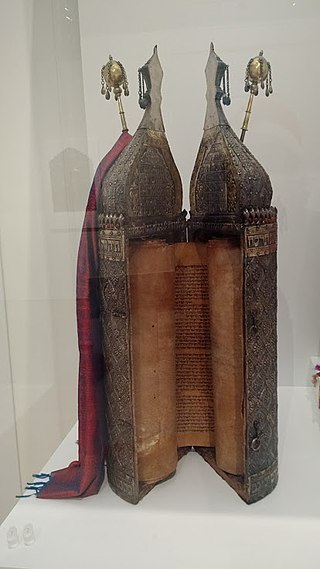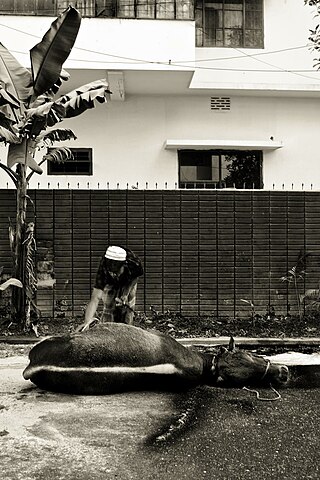
Islamic dietary laws are laws that Muslims follow in their diet. Islamic jurisprudence specifies which foods are halal and which are haram. The dietary laws are found in the Quran, the holy book of Islam, as well as in collections of traditions attributed to the Islamic prophet Muhammad.

Haram is one of several similar words originating from the triliteral Semitic root Ḥ-R-M. The word literally means "sanctuary," commonly used by Muslims to refer to Al-Masjid Al-Haram and Prophet Mohammad's Mosque. There are certain rules which Muslims within these two areas must follow.
Haram is an Arabic term meaning 'forbidden'. This may refer to either something sacred to which access is not allowed to the people who are not in a state of purity or who are not initiated into the sacred knowledge; or, in direct contrast, to an evil and thus "sinful action that is forbidden to be done". The term also denotes something "set aside", thus being the Arabic equivalent of the Hebrew concept חרם (ḥērem) and the concept of sacer in Roman law and religion. In Islamic jurisprudence, haram is used to refer to any act that is forbidden by Allah and is one of the five Islamic commandments that define the morality of human action.
Al-Kawthar is the 108th chapter (sūrah) of the Quran. It is the shortest chapter, consisting of three ayat or verses:
Al-Falaq or The Daybreak is the 113th and penultimate chapter (sūrah) of the Qur'an. Alongside the 114th surah (Al-Nas), it helps form the Al-Mu'awwidhatayn. Al-Falaq is a brief five ayat (verse) surah, asking God for protection from evil:
Taqwa is an Islamic term for being conscious and cognizant of God, of truth, "piety, fear of God." It is often found in the Quran. Those who practice taqwa — in the words of Ibn Abbas, "believers who avoid Shirk with Allah and who work in His obedience" — are called muttaqin.
An-Nisa' is the fourth chapter (sūrah) of the Quran, with 176 verses (āyāt). The title derives from the numerous references to women throughout the chapter, including verse 34 and verses 4:127-130.

Al-Ma'idah is the fifth chapter of the Quran, containing 120 verses. Regarding the timing and contextual background of the revelation, it is a Medinan chapter, which means it is believed to have been revealed in Medina rather than Mecca.
Al-Muʼminun is the 23rd chapter (sūrah) of the Qur'an with 118 verses (āyāt). Regarding the timing and contextual background of the supposed revelation, it is an earlier "Meccan surah", which means it is believed to have been revealed before the migration of the Islamic prophet Muhammad and his followers from Mecca to Medina (Hijra).
At-Taghābun is the 64th surah of the Quran with 18 verses. This Medinan surah opens with the words of glorification of God, it is part of Al-Musabbihat group. The theme of this surah is an invitation to the Faith, obedience and the teaching of good morals, contrasting with the previous surah, Al-Munafiqun, which was concerned with hypocrisy and the lack of Iman.
Al-Maʻārij is the seventieth chapter (sūrah) of the Qur'an, with 44 verses (āyāt). The Surah takes its name from the word dhil Ma'arij in the third ayah. The word appears twice in the Quran. Abdullah Yusuf Ali, an Indian Islamic scholar, introduces the surah as “... another Islamic eschatology Surah closely connected in subject matter with the last one. Patience and the mystery of Time will show the ways that climb the Heaven. Sin and Goodness must each eventually come to its own.” It is narrated from the Prophet that whoever recites Surah al-Ma'ārij, Allah will give him the rewards of those who keep their trusts and promises and those who observe upon performing their daily prayers.[6]
Sūrat al-Layl is the ninety-second sūrah (chapter) of the Qur'an, containing twenty-one āyāt (verses). This sūrah is one of the first ten to be revealed in Mecca. It contrasts two types of people, the charitable and the miserly, and describes each of their characteristics.
In Islam, bidʿah refers to innovation in religious matters. Linguistically, the term means "innovation, novelty, heretical doctrine, heresy". Despite its common use in Muslim texts, the term is not found in the Qur'an.

The Tawrat, also romanized as Tawrah or Taurat, is the Arabic-language name for the Torah within its context as an Islamic holy book believed by Muslims to have been given by God to the prophets and messengers amongst the Children of Israel. In the Qur'an, the word 'Tawrat' occurs eighteen times. When referring to traditions from the Tawrat, Muslims have not only identified it with the Pentateuch, but also with the other books of the Hebrew Bible as well as with Talmudic and Midrashic writings.
Indeed, We sent down the Torah, in which was guidance and light. The prophets who submitted [to God] judged by it for the Jews, as did the rabbis and scholars by that with which they were entrusted of the Scripture of God, and they were witnesses thereto. So do not fear the people but fear Me, and do not exchange My verses for a small price [i.e., worldly gain]. And whoever does not judge by what God has revealed - then it is those who are the disbelievers.

In Islamic law, dhabihah, also spelled zabiha, is the prescribed method of slaughter for halal animals. It consists of a swift, deep incision to the throat with a very sharp knife, cutting the wind pipe, jugular veins and carotid arteries on both sides but leaving the spinal cord intact. The butcher is also required to call upon the name of Allah individually for each animal.
Islamic ethics is the "philosophical reflection upon moral conduct" with a view to defining "good character" and attaining the "pleasure of God". It is distinguished from "Islamic morality", which pertains to "specific norms or codes of behavior".
According to Islam, animals are conscious of God. According to the Quran, they praise Him, even if this praise is not expressed in human language. Baiting animals for entertainment or gambling is prohibited. It is forbidden to kill any animal except for food or to prevent it from harming people.
In its Arabic text, the Quran is considered the primary source of authority by Muslims. The Quran is a relatively short book of 77,797 words that are divided into one hundred and fourteen chapters (Suras). A hundred and thirteen of the chapters of the Quran begin with an indication of the book's intent.
In Islam, morality in the sense of "non practical guidelines" or "specific norms or codes of behavior" for good doing are primarily based on the Quran and the Hadith – the central religious texts of Islam – and also mostly "commonly known moral virtues" whose major points "most religions largely agree on". They include kindness, charity, forgiveness, honesty, patience, justice, respecting parents and elders, keeping promises, and controlling one's anger, love of God and those God loves, love of his messenger (Muhammad) and of believers.
Astrology refers to the study of the movements and relative positions of celestial bodies interpreted as having an influence on human affairs and the natural world. In early Islamic history, astrology, was "by far" the most popular of the "numerous practices attempting to foretell future events or discern hidden things", according to historian Emilie Savage-Smith.




